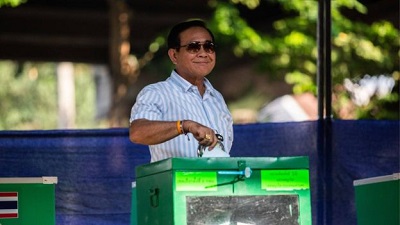
Two rival camps contesting Thailand’s first election since the military coup in 2014 have both said they are trying to form a coalition government.
Early results give the pro-military Palang Pracha Rath Party (PPRP) a larger share of the popular vote.
At the same time, the main opposition Pheu Thai party currently has the biggest number of seats in parliament.
But there are growing complaints about irregularities during Sunday’s poll and a vote count marred by confusion.
The Electoral Commission (EC) is also facing strong criticism for its decision to delay publishing the full results without providing any explanation.
Thailand’s complicated electoral system allocates some parliamentary seats according to the number of votes received.
Critics say electoral law changes introduced by the military in 2017 are primarily designed to keep pro-military forces in power.
On Monday, the EC announced that Pheu Thai party, which is linked to former Prime Minister Thaksin Shinawatra, had won 137 seats in the 500-strong lower chamber of parliament.
The PPRP, which supports Thailand’s current leader General Prayuth Chan-ocha, was in the second place with 97 seats.
Several other parties were getting between 30 and 39 seats each.
But the winners of 150 seats were still unclear, the EC said.
At the same time, the commission earlier said that with more than 90 per cent of ballots counted, the PPRP had gained 7.6m of the popular vote. That is half a million more than Pheu Thai.
Amid confusion over a vote count, the EC was expected to clarify the preliminary results at a news conference on Monday.
But the EC instead again delayed announcing the preliminary figures. It also said there would be no official results until May 9.
More than 50 million people were eligible to vote in a much-delayed election, the first since Gen Prayuth Chan-ocha led the coup that ousted Mr Thaksin’s sister, Yingluck Shinawatra, five years ago.
But the reported turnout was unexpectedly low, at just 64 per cent. Many questioned this figure as well as discrepancies in the vote count numbers.
Speaking to journalists, the EC’s secretary-general, Charungvith Phumma, blamed “human error”, saying the people who put the numbers of votes in were just regular people.
The EC later said that media had misreported the data it was giving them, and that its servers had suffered from unspecified hacking attacks. –BBC






